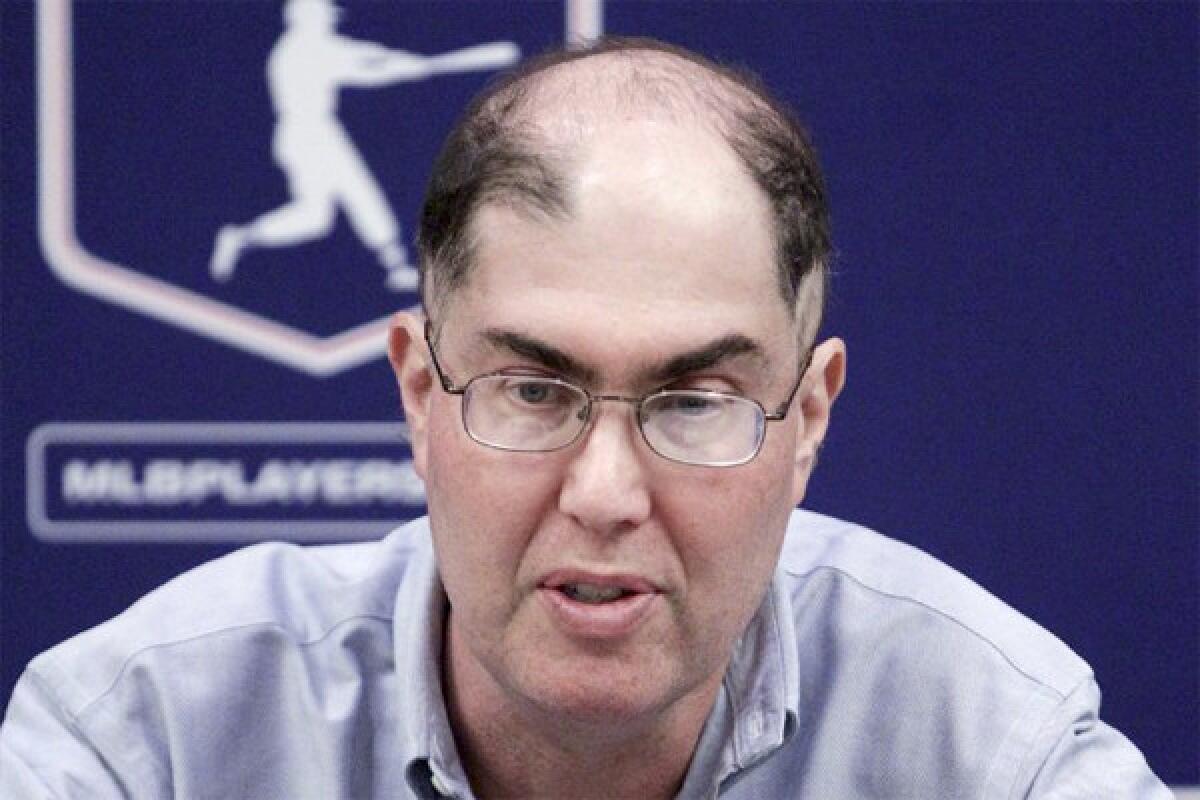MLBPA’s Michael Weiner continues to work, even as he labors with illness

- Share via
Michael Weiner can return a smile. He cannot return a handshake, at least not with his right hand.
So he extended his left hand, over and over again, to the biggest stars and most prominent executives in baseball. It was remarkable, in every sense of the word, to see him on the field at the All-Star game.
He can no longer walk, so he sat in a wheelchair, moving when someone else could push him. He can no longer control his right side, so his right arm was strapped to a shelf attached to the wheelchair.
Who among us would want our friends to see us like this, let alone 40,000 people in a baseball stadium?
Weiner, the executive director of the Major League Baseball Players Assn., is fighting brain cancer. He kept up a full schedule at the All-Star game, including meetings with players and reporters to discuss the details of baseball’s latest investigation into performance-enhancing substances, and the suspensions that loom.
He did not take offense at the question of why he would do all this, in this condition, for all the world to see. He had no hesitation in answering, even as his voice grew soft, and as a trace of a tear appeared in his left eye.
“I don’t know if I will be able to do this again. If the doctors’ prognostications and numbers are right, I probably won’t,” Weiner said. “Because of that, I want to be wherever I can be.”
Weiner is not a household name among baseball fans. For that, fans can be grateful. On his watch, there have been no strikes, no lockouts, no obstinate challenges to the reform of baseball’s drug policy.
He is an attorney who dresses in polo shirts and jeans, a Bruce Springsteen disciple with an unusual ability to translate legal jargon into plain English.
“Probably the smartest dude I have ever been around,” Baltimore Orioles outfielder Adam Jones said.
Tony Clark, a former major league first baseman, got involved with the union during his playing career. He has since become a union executive, serving under Weiner.
“He is the type of individual you believe the rules don’t apply to,” Clark said. “He has a combination of compassion, strength, respect and brilliance.
“Guys like Michael don’t come around very often. There is not a day that goes by that I don’t find myself trying to determine, ‘If I was Michael, what direction would I take?’”
Weiner went full speed ahead, in every direction. His tumor is inoperable. In the year since his cancer was diagnosed, and amid rounds of chemotherapy and radiation, he has skipped one week of work. In spring training, he traveled to Arizona and Florida to meet with players, scheduled around return trips to New York for MRI examinations.
“I saw him in spring, walking, talking, doing everything,” Detroit Tigers outfielder Torii Hunter said. “To see him in a wheelchair is tough.
“With the way he looks right now, I can’t look at him. You don’t want to show any signs of being sympathetic, because he might not want that. I can tell you one thing: He is going to fight, he is going to work, no matter what is going on.”
The cliche is that work should give way to family at a time like this. Weiner has a strong, supportive family. But he has worked for the union for 25 years, and players are family too. They look out for him, just as he looks out for them.
“It is awesome that he is coming out and supporting us, with what he is going through,” Dodgers pitcher Clayton Kershaw said.
“All the players and myself have so much respect and love for him, and for all that he has done for us. We’re going to be as supportive as we possibly can.”
Weiner is 51. He is far too young to be talking about who might succeed him when he can no longer work, and yet he does so frankly and publicly, with a courage we all would hope we could muster. In a game played by young men, Weiner is bravely opening a window to mortality.
Bud Selig turns 79 next week. Among his peers, mortality is a far-too-frequent theme. Selig was in a hotel ballroom last week, on the afternoon of the All-Star game, when he heard Weiner was in an adjacent hallway.
Selig excused himself. He walked into the hallway and leaned down, toward the wheelchair, putting his right hand on Weiner’s left shoulder, exchanging pleasantries, inviting him to enjoy the game from the commissioner’s suite.
“It’s air-conditioned,” Selig said.
Selig usually has a few words on any subject, even if all he does is dance around the subject. Selig politely declined to speak about his interaction with Weiner, but you could see the sadness and anguish in the commissioner’s face.
The baseball world will gather in Minnesota for next year’s All-Star game. Weiner probably won’t make it.
When Jews celebrate their deliverance from slavery each spring, they conclude with these words: “Next year in Jerusalem.” It is not a literal itinerary. Rather, it is an expression of hope and faith and, yes, miracles.
So God bless, Michael, and next year in Minnesota.
Twitter: @BillShaikin
More to Read
Go beyond the scoreboard
Get the latest on L.A.'s teams in the daily Sports Report newsletter.
You may occasionally receive promotional content from the Los Angeles Times.











